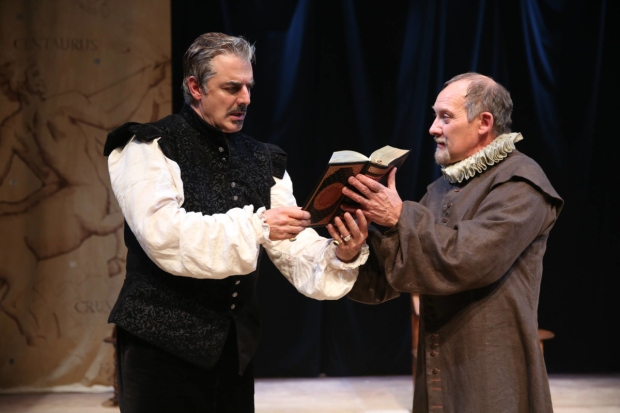Doctor Faustus

(© Joan Marcus)
The phrase "tragical history" in the title of a play is usually a good indication that there won't be much humor. A case in point is Christopher Marlowe's 400-year-old morality play The Tragical History of the Life and Death of Doctor Faustus, which follows a man who sells his soul to the devil in exchange for 24 years of knowledge and magical debauchery. Doesn't seem like a knee-slapper, does it?
Actually, in this case, it is. While audiences may forget that Marlowe loaded his play with bawdiness to offset the hardboiled drama, director Andrei Belgrader hasn't. In fact, his fast-and-furious revival of the work, now at Classic Stage Company with The Good Wife regulars Chris Noth and Zach Grenier as its leading men, emphasizes the text's low humor over just about everything else. Is it jarring? Yes. But in a vein similar to Marlowe's original. Still, Belgrader's vision turns Doctor Faustus into an unexpected treat that just may be the comic hit of the summer.
In theory, there are two story lines in Doctor Faustus, performed in a new colloquial adaptation by Belgrader and David Bridel. The first concerns Faustus (Noth), the bored scholar who takes up necromancy and sells his soul to Lucifer (Jeffrey Binder) in exchange for two dozen years of servitude to a devil called Mephistopheles (Grenier). Together, the pair travels the world, benignly wasting the new powers granted to Faustus; instead of using them to further his knowledge, he's more interested in playing pranks on figures like the Pope.
The second story line follows Robin (Lucas Caleb Rooney), the servant of Faustus' servant Wagner (Walker Jones), who steals one of the doctor's conjuring books to play some tricks on unsuspecting victims. As the play's comic relief, the whimsical magic performed by Robin, with his dim sidekick Dick (Ken Cheeseman), is the counterpoint to the supposedly solemn sorcery invoked by Faustus.
Robin's prey turns out to be members of the audience, and the results are genuinely uproarious. Rooney and Cheeseman are gifted comic actors who skillfully deliver the innuendo-filled language (including frequent penis jokes). They have a knack for rubber-limbed physical comedy and prove themselves expert improvisers in situations like the one at the reviewed performance, where a called-upon spectator managed to turn their whole bit on its ear.
Their brilliance and Grenier's grizzled, fed-up Mephistopheles are the standouts of this production. But with Belgrader emphasizing the shtick, Noth is placed at an extreme disadvantage. He has the makings of an intriguing Faustus, brooding and intelligent, and handsome in Rita Ryack and Martin Schnellinger's Renaissance-era costumes, but he's not commanding enough to pull back the focus to his own journey after the comic scenes, from which he's largely absent.
That aspect, though, can't be blamed entirely on Noth or Belgrader. Jarring transitions are a trait of the original material, which similarly bounces back and forth from bawdiness to seriousness. If anything, Belgrader, using a DIY-style set by Tony Straiges and seductive lighting by Jason Lyons, has actually embraced the bipolar nature of the material. He guides both the laughter and the somberness to extreme levels of mania. This might not seem like the Doctor Faustus we read in Brit Lit 101, but it might hew closer to Marlowe's original intent than it at first seems.










